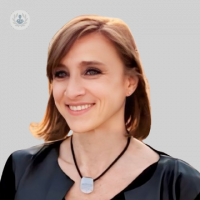Inherited heart diseases and family screening
Written by:Accurate cardiac screening and family screening are essential to protect against heart disease and to monitor those who are at risk of developing a heart condition. But what is family screening? Esteemed London-based cardiologist Dr Teresa Castiello details exactly what cardiac and family screening are and explains why certain heart conditions are inherited.

What is cardiac screening?
First of all, let’s clarify the difference between cardiac screening and prevention. To some extent the two terms are interchangeable, but there are substantial differences.
Prevention refers to all actions that can be taken to improve health through lifestyle changes and health checks, to stop or delay the onset of cardiac diseases. Cardiac screening is a way of preventing cardiac disease through regular or specific cardiac checks. Cardiac screening is performed to check for a specific or common cardiovascular condition before symptoms show.
It is a good habit to attend cardiac screenings, also called cardiac health checks, to make sure the heart is healthy. It is important to have your blood pressure measured and to get other common blood tests taken, such as cholesterol and sugar levels. It is certainly worth considering a visit to a cardiologist for an electrocardiogram (ECG), especially if you’ve never had one. Usually, a cardiologist assessment with ECG, in combination with common blood tests, is the very first step taken when screening for the presence of cardiovascular disease.
What is family screening?
Family screening is a specific form of cardiac screening. It is crucial when a close family member, such as a parent, sibling, or child, has been diagnosed with a genetic cardiac disorder. The vast majority of family screening for inherited cardiac diseases include a cardiology assessment, an ECG, and an echocardiogram as first-line tests. Cardiac MRI is offered as a common second-line test. If the family member has been diagnosed with inherited cardiomyopathy, the family screening should be performed by a cardiomyopathy specialist, like me.
Do heart problems run in families?
It is important to clarify what ‘genetic’ means. Genetic disorders are associated with a specific genetic mutation, i.e., a small error in a chromosome. These disorders do run in the family and are easily passed from parent to child. Some conditions are very well known and are associated with a single genetic error; however, these genetic diseases can be very complex. The same genetic mutation can evolve in a mild or severe disease (this phenomenon is called ‘penetrance’). Sometimes more than one gene is involved, causing different heart conditions in the same family.
Some other cardiovascular diseases are not strictly linked to a specific genetic mutation, but there may be some ‘predisposition’ in the family. There are ‘familiar’ factors. Common conditions like hypertension or coronary disease, for instance, are commonly not linked to a genetic mutation, but some families are more prone to developing them. This is usually due to an interplay between genetics and lifestyle and in these cases, primary prevention is crucial.
Who is a suitable candidate?
If someone has a suspected or diagnosed genetic mutation, which causes cardiomyopathy or rhythm disturbances, any first-degree family member should be screened. This includes parents, brothers, sisters, and adult children. Whether a young child may need to be screened depends on the genetic mutation and its likelihood of causing a problem in childhood. A cardiomyopathy specialist will be able to recommend the necessary steps to take.
At what age do heart problems usually occur?
Despite being born with a genetic mutation, conditions tend to develop later in life and can vary quite broadly depending on the mutation. Symptoms and signs of dilated cardiomyopathy typically occur between the ages of 30 and 50. But in some cases, they can appear much earlier, even in childhood, and others will be affected much later. Hypertrophic cardiomyopathy can present at any age, but more commonly presents during periods of growth, in the late teens or early twenties. TTR amyloidosis is a slowly progressing condition caused by the abnormal deposit of protein called transthyretin and this occurs in the elderly population. Seeking a cardiomyopathy specialist’s opinion is vital if a family member has been diagnosed with a heart muscle disorder.
What else should I do if my family has a history of heart disease?
Any genetic disorder can be influenced by lifestyle, so healthy lifestyle choices are always relevant. The vast majority of cardiac diseases benefit from exercise, however, there are a few genetic diseases that are worsened by prolonged intensive activity. For people with arrhythmogenic cardiomyopathy, light exercise such as a long walk is advisable, but moderate or intense exertion can worsen the condition and be dangerous. If there is myocardial inflammation, exercise should be avoided too, similarly to how you would avoid running if your knee was inflamed and painful. It’s important to remember that conditions that benefit from physical activity are the exceptions to the norm. Most cardiac conditions benefit enormously from an active lifestyle. If a family member has heart disease, a clear diagnosis is a priority. If it is a genetic disease, it is crucial to be screened by a cardiomyopathy specialist.
If you are interested in booking a consultation with Dr Teresa Castiello for a cardiac screening, you can do so by visiting her Top Doctors profile.


